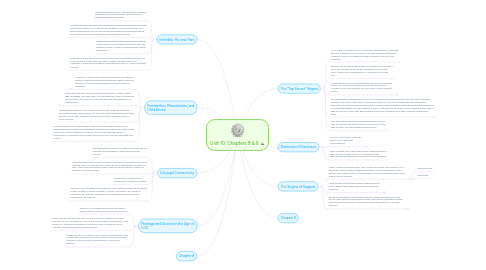Unit 10: Chapters 8 & 9
by Jorge Stefan Crespo


1. Infertility: His and Hers
1.1. Gendered suffering by a cultural system in which hegemonic masculinities and femininities are instantiated through fertility
1.2. As a threat to gender identities, infertility compromises both femininities and masculinities in a society where motherhood and parenthood are simply expected of all married couples and where the expressed desire for children is strong on the part of both women and men
1.3. Patriarchal bargain: agreeing before marriage to pursue high-tech infertility treatments with her husband-to-be in order to guarantee his future fatherhood
1.4. Infertility in a man may elicit a wife's sympathy and protectiveness, but in some cases, it may lead women to assume marital power and authority in ways that are deeply threatening to men in a male-dominant society
2. Marriage and Divorce in the Age of ICSI
2.1. Divorce is considered a difficult and serious affair in Egypt, both socially and economically.
2.2. New marriage contract has led to more pre-marital testing of women and men for HIV and sterility. This new contract has the potential to curb the pain of childless marriages by finding out well in advance about infertility or suffering from a sterilizing STD.
2.3. Female intitiation of divorce may remain stigmatized-a sign of bad faith. And divorce simply doesn't make sense when a woman truly loves her marital partner, even if he is infertile.
3. The "Top Secret" Stigma
3.1. IVF in Egypt performs a kind of "double stigmatization", whereby the very treatment to overcome an already stigmatizing health condition leads to an additional layer of stigma, secrecy, and suffering.
3.2. Stigma is an attribute that makes one different from others and of a less desirable kind, thus reduced in our minds from a whole and usual person to a tainted, discounted one.
3.3. Infertile women describe themselves, and are described by others, as :missing" motherhood, and are even called "Mother of the Missing One" as a reminder or their infertile status.
3.3.1. Included
3.3.2. Included
3.3.3. Excluded
3.4. Enacted stigma is experienced almost exclusively by women in Egypt. First and most important, infertile men are typically able to keep their infertility a secret, through their own denial and disimulation, as well as though the active collusion of wives who protect their infertile husbands by accepting the blame for the infertility. Second, infertile men rarely feel under marital threat; that is they do not live in fear that their wives will become frustrated over their infertility and divorce them.
3.5. Men who are infertile are rarely reminded or taunted. Men are simply free from the kind of fertility scrutiny that is a part of every Egyptian woman's life.
4. Femininities, Masculinities, and Child Desire
4.1. In Egypt no adult, male or female, admits to not wanting children. Women and husbands express ardent desire for children, at times specifying ideal number and sex of offspring.
4.1.1. Project specifications
4.1.2. End User requirements
4.1.3. Action points sign-off
4.2. Although most elite women express satisfaction in their careers, their marriages, and their own accomplishments, they nonetheless felt that their lives were "incomplete" without the experience of motherhood.
4.2.1. Define actions as necessary
4.3. Motherhood deemed to be a "natural" part of life, linked to feminine drives and desires that emerge at a very early age. Religiously supported beliefs in an innate "maternal instinct" are strong in Egypt among all social classes.
4.4. "Intimate selving" in Middle Eastern families involves expectations of so called patriarchal connectivity, whereby men assume patriarchal power in the family not only with age and authority, but also through the explicit production of offspring, whom they love and nurture, but also dominate and control.
5. Conjugal Connectivity
5.1. Among Egyptian Copts, marriage is so highly valued that they are forbidden to get divorced once married.
5.2. Given the high cultural value placed on marriage, it is perhaps surprising that the notion of the married couple is not well developed in Egypt; in fact, a word for the human couple does not exist in either classical or Egyptian colloquial Arabic.
5.3. Marriage is for purposes of procreation and family building,
5.4. Desires to be conjugally connected to one's marital partner are important in the context of marital infertility- intense connection as a result of childlessness. Infertile couples are not distracted from their marital relationship by children.
6. Dilemmas of Disclosure
6.1. To tell or not to tell. And to tell whom and under what circumstances.
6.1.1. Materials
6.1.2. Personel
6.1.3. Services
6.1.4. Duration
6.2. Many couples worry about the future stigmatization of their children if their means of conception were generally known and questioned as potential bastards.
7. The Stigma of Support
7.1. There is alack of support seen. The climate of secrecy surrounding IVF in Egypt has clearly affected the establishment of both professional and patient led support groups. Stigmatization of psychological support itself lead to lack of support.
7.1.1. Dependencies
7.1.2. Milestones
7.2. Many women feared that patient support groups would exacerbate rather than alleviate their own suffering.
7.2.1. Schedule
7.2.2. Budget
7.3. Because psychiatrists and psychologists in Egypt generally deal with worst case scenarios the Egyptian public has clearly associated mental health professionals with craziness and therefore loathe to use their services.
7.3.1. KPI's
